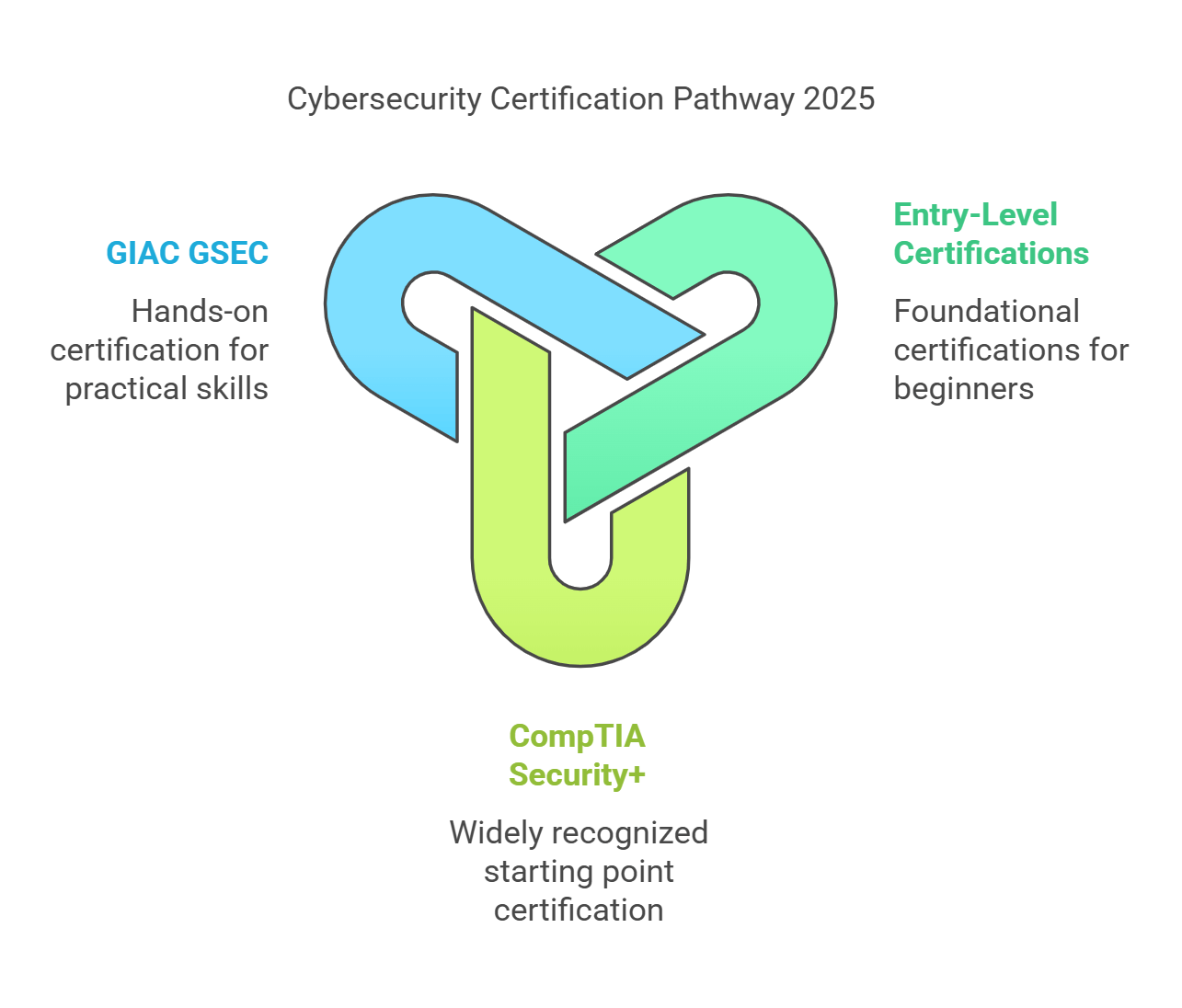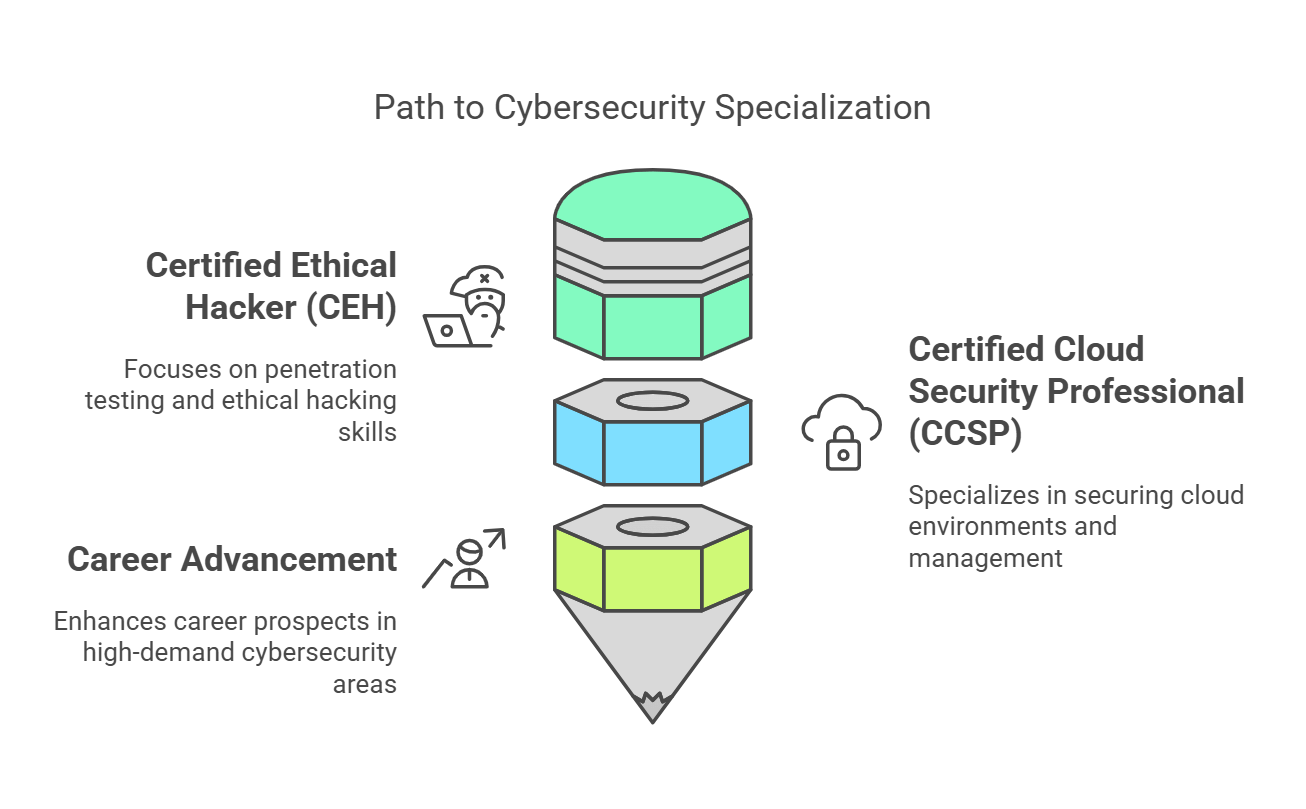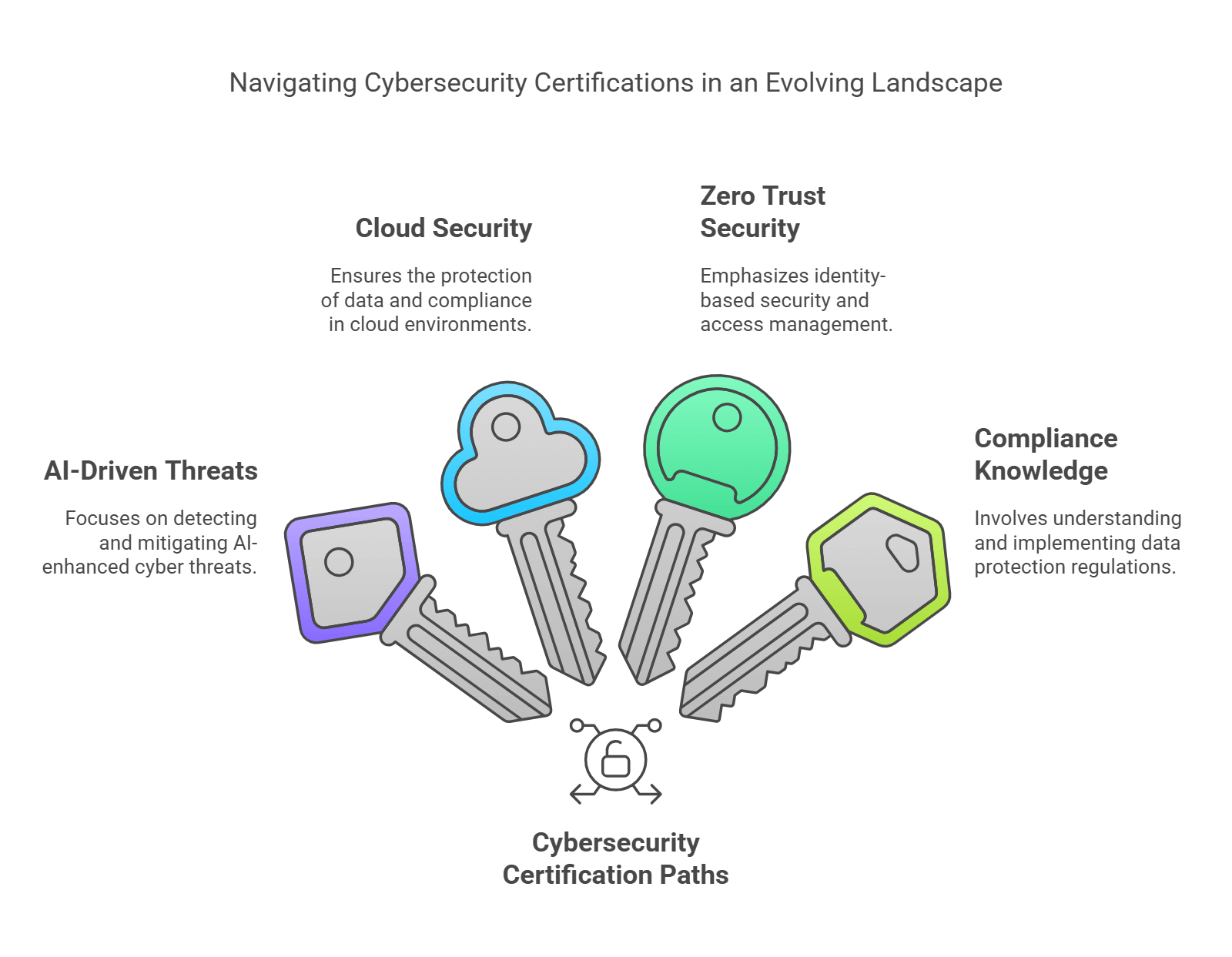Table of Contents
- Why Follow a Cybersecurity Certification Roadmap in 2025?
- Key Certifications to Include in Your Cybersecurity Certification Roadmap 2025
- 1. Entry-Level Certifications
- CompTIA Security+
- GIAC GSEC (Security Essentials)
- Why These Certifications?
- 2. Mid-Level Certifications
- 3. Advanced Certifications
- Trends Driving Decision-Making in 2025 Certification Paths
- How to Build Your Cybersecurity Certification Roadmap 2025
- Final Thoughts
- FAQs About Cybersecurity Certification Roadmap 2025
The cybersecurity landscape is evolving rapidly in 2025, with cyber threats becoming more sophisticated and widespread. As the world becomes increasingly digital, the demand for skilled cybersecurity professionals continues to soar. This has created a wealth of opportunities for individuals who are looking to enter the field or advance their careers. One of the best ways to enhance your credentials and improve your job prospects is by obtaining industry-recognized cybersecurity certifications.
A well-structured cybersecurity certification roadmap 2025 can help you navigate the complex landscape of certifications, focusing on what matters most for your career. This guide will walk you through the most relevant certifications at every stage of your cybersecurity career journey and explain how to choose the right path based on your career goals and industry trends. Let’s dive in!
Why Follow a Cybersecurity Certification Roadmap in 2025?
By 2025, there is a greater need for cybersecurity professionals than ever before. The complexity of threats has increased with AI-driven attacks, cloud vulnerabilities, and zero-trust architectures, thus, organizations require experts who are trained to secure their systems and data. A cybersecurity certification roadmap is crucial to guarantee that you are acquiring the appropriate skills in line with these new trends.
The roadmap will help you to remain on track of the certifications that are most important and will not leave you guessing. It enables you to learn at a pace that is one step at a time, and thus you do not get to spend your time on certifications that are not important. As the cybersecurity world is expected to shift in 2025, certifications will be your guide to staying current. The right certifications will allow you to gain specialized skills in high-paying domains like cloud security, AI-enhanced threat detection, and cyber risk management — from foundational knowledge to advanced expertise.
Through this roadmap, you will be able to steer your career path towards the current and future needs of the industry such that you are always valuable in the market.
Key Certifications to Include in Your Cybersecurity Certification Roadmap 2025
A successful cybersecurity career roadmap should include a mix of entry-level, mid-level, and advanced certifications, each serving as a stepping stone to more specialized and high-paying roles. Let’s explore the key certifications you should include in your roadmap to help you build a strong foundation and advance your career.

1. Entry-Level Certifications
Foundation-level certifications are intended to provide a first introduction to core cybersecurity concepts. They are ideal for anyone new to the cybersecurity field or changing careers from another discipline. These entry-level certifications address critical areas like network security, incident response, and risk management which are the fundamentals of the cybersecurity profession.
Key entry-level certifications for 2025 include:
CompTIA Security+
This foundational certification is widely regarded as the starting point for anyone entering the cybersecurity field. It covers basic topics such as threat management, network security, and risk assessment. Security+ is ideal for aspiring security professionals and junior analysts.
GIAC GSEC (Security Essentials)
GSEC is a certification that is more oriented towards practical knowledge of active defense and system security. For those who learn better by doing and want to put their knowledge into practice right away in real-life situations, it is perfect.
Why These Certifications?
Security + and GSEC are entry-level certifications that are good starting points in the field of cybersecurity for anyone. These certifications are internationally recognized and are frequently used as entry-level certifications for junior positions such as IT security analyst, network administrator, and incident responder. In the year 2025, these certifications are still the way to go for a great cybersecurity career.
2. Mid-Level Certifications
Once you have gained some basic knowledge it is time to move forward to mid-level certifications. These certifications are perfect for people who have some cybersecurity experience and want to build on it. Specialize in mid-level certifications in niche areas like penetration testing, cloud security, or ethical hacking, to deepen your expertise if you have some experience in cybersecurity.
Key mid-level certifications for 2025 include:

Certified Ethical Hacker (CEH)
CEH is one of the most iconic ethical hacking and penetration testing certifications. It teaches people how to find the vulnerabilities and weaknesses in the systems and gives people the ability to hack into the systems legally so that companies can identify the vulnerabilities that can be exploited by malicious hackers.
Certified Cloud Security Professional (CCSP)
Cloud security is one of the most important aspects of cybersecurity as more and more businesses move to the cloud. CCSP is for professionals who are interested in focusing on the security of cloud environments. Areas like cloud governance, cloud architecture, and cloud security management are growing in importance with organizations as they move to cloud technologies as CCSP covers topics such as cloud governance, cloud architecture, and cloud security management.
Why These Certifications?
Mid-level certifications like CEH and CCSP are ideal for people interested in focusing on the most demanding functions. As the use of AI increases and the role of cloud infrastructure becomes crucial in 2025, these certifications provide focused knowledge that can greatly contribute to your career growth. They help you transition from security fundamentals to the specific skills that are critical in the current cybersecurity employment marketplace.
3. Advanced Certifications
For people who have worked in the profession and are looking to move up to management, the next step is advanced certifications. They prepare you for in-depth knowledge of large-scale security management, security policies, and risk management strategies. Advanced certifications are for people who wish to manage security teams or to work in strategic cybersecurity management positions.
Key advanced certifications for 2025 include:
Certified Information Systems Security Professional (CISSP)
CISSP is widely considered one of the highest certifications for information security managers. It covers eight domains of security, including security management, access control, security operations, and network security. In 2025, the CISSP still holds one of the most prestigious certifications for professionals who are responsible for managing enterprise-level security programs.
Certified Information Security Manager (CISM)
For security management professionals, CISM is designed to address the management and governance of a company’s information security program. The strategic aspects of security, such as risk management, incident management, and security program development, are the main focus.
ACSMI Certification
This certification comes with over 400 modules across cutting-edge areas like cloud security, AI-enhanced security, zero-trust frameworks, and incident forensics. A senior technical leadership career-oriented professional, this certification is for, gaining a profound understanding of the latest security technologies and practices. ACSMI is one of the most holistic certifications in the cybersecurity domain.
Why These Certifications?
Senior individuals who manage complex security operations require advanced certifications like CISSP, CISM, and ACSMI. In 2025, cloud platforms and AI-based security solutions will be prevalent, and these advanced certifications become essential for leaders of all enterprises to secure modern.
Trends Driving Decision-Making in 2025 Certification Paths
In 2025, the cybersecurity field will be shaped by rapidly evolving technologies and emerging threats. Staying updated on these trends is key to ensuring your certifications remain relevant and valuable.

AI-Driven Threats
AI-driven threats have become a significant challenge in cybersecurity. Cybercriminals are increasingly using artificial intelligence and machine learning to automate attacks, making them more sophisticated and difficult to detect. As a result, professionals with expertise in AI-driven threat detection and machine learning in cybersecurity are highly sought after. Certifications focusing on AI applications in security, such as ACSMI’s AI-enhanced security modules, are gaining importance.
Cloud Security Expansion
As businesses continue to migrate to the cloud, the demand for cloud security professionals continues to rise. Cloud security certifications like CCSP and ACSMI’s cloud-focused modules are essential for securing cloud infrastructures. These certifications are crucial as organizations look to protect their sensitive data and maintain compliance in cloud environments.
Zero Trust and Identity-Based Security
Zero trust architecture is becoming the standard security framework, this approach assumes no one, whether inside or outside the organization is trusted by default. As zero trust models become more widespread, identity-based security and access management certifications are going to be essential. In 2025 there will be a high demand for professionals with expertise in these areas.
Compliance and Regulatory Knowledge
The GDPR and CCPA are new data protection regulations that governments are implementing all over the world. Hence, it is vital for organizations to have cybersecurity professionals who know about compliance and regulatory frameworks in order to meet these requirements. Compliance management is the core of CISM and ACSMI certifications, thus, they are vital for cybersecurity professionals responsible for the protection of sensitive data.
How to Build Your Cybersecurity Certification Roadmap 2025
Building a cybersecurity certification graph is essential to ensure that you are progressing in the right direction. Here’s how you can create a roadmap tailored to your career goals and the demands of the cybersecurity industry:
Step 1: Assess Your Career Goals
The first thing you need to do when creating your roadmap is to determine whether you want to go for a technical or a managerial path. For hands-on technical roles like penetration testing, CEH certifications are ideal. For managerial roles, there are certifications like CISM, or CISSP that are more oriented towards leadership and strategy.
Step 2: Research Industry Demands
Stay in the know about what certifications will be in demand in 2025. To determine which certifications are most desirable in this year, turn to job boards, industry reports, and other sources. The cybersecurity certification roadmap should match the most relevant skills that are important in the current market today.
Step 3: Choose Accredited Programs
Accreditation by well-known organizations is important, select programs that are accredited. Security+, CISSP and ACSMI have globally recognized certifications and credibility boosts that will help to improve your career prospects.
Step 4: Consider Learning Style and Schedule
Choose certifications that are appropriate for your learning preference and time. If you are working full time then check for programs with flexible schedules, for instance,e ACSMI has online modules that you can do in your own free time.
Step 5: Gain Hands-On Experience
Practical experience is valued by employers. Make sure that the certifications you choose have hands-on labs or simulate the real-world application of the learning that you gain. The CEH and ACSMI programs, for example, include interactive labs and simulations that are essential for gaining experience.
Final Thoughts
Building a career in cybersecurity in 2025 requires informed decision-making and strategic planning. By following the cybersecurity certification roadmap, you ensure that your efforts are focused on the most relevant certifications that align with current and future industry needs. Whether you’re starting with CompTIA Security+ or moving on to advanced certifications like CISSP or ACSMI, the right certifications will set you on a path to success.
The cybersecurity field is growing fast, and the opportunities for those who stay ahead of the curve are endless. Your roadmap to success begins today. Start planning your path, and secure your place in the future of cybersecurity.
FAQs About Cybersecurity Certification Roadmap 2025
1. What certifications should beginners pursue in 2025?
For beginners, certifications like CompTIA Security+ or GIAC GSEC are perfect starting points. These certifications focus on core concepts such as network security, risk management, and incident response, setting a solid foundation for future growth.
2. How do I choose the right certification for my career goals?
Identify whether you want a technical or managerial role. If you’re aiming for hands-on roles, certifications like CEH are ideal. For managerial roles, focus on certifications like CISM or CISSP.
3. Is hands-on experience necessary to succeed in cybersecurity?
Yes, hands-on experience is essential. Employers increasingly seek candidates with practical experience. Certifications like ACSMI and CEH offer real-world labs that help you gain applicable skills.
4. How often should certifications be renewed, and why is it important?
Most certifications require renewal every 2 to 3 years. Renewal ensures your knowledge stays current with evolving threats and technologies.
5. What role do cybersecurity certifications play in landing a job?
Certifications validate your expertise and commitment to cybersecurity. They are often required for roles such as security analyst, penetration tester, and cloud security specialist.
6. Can I work in cybersecurity without prior IT experience?
Yes, many entry-level roles are accessible without prior IT experience. Certifications like Security+ and ACSMI offer structured learning paths for beginners.
7. What’s the biggest advantage of following the cybersecurity certification roadmap 2025?
The roadmap helps you focus on the most relevant certifications, aligning your skills with industry demands. It ensures your career growth is aligned with trends such as AI-driven security and cloud security.
8. How do I stay updated on new cybersecurity trends?
To stay current, follow industry blogs, attend webinars, and participate in cybersecurity communities. Regularly review the latest reports on emerging threats and technologies to stay ahead.

Leave a Reply